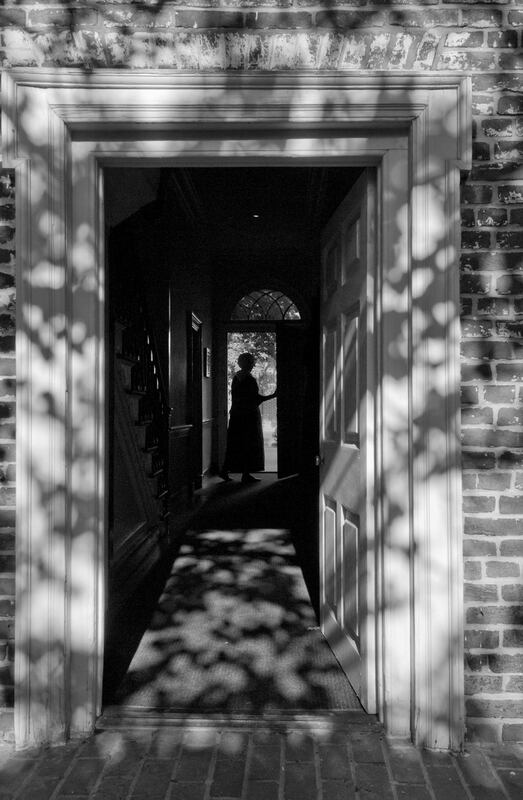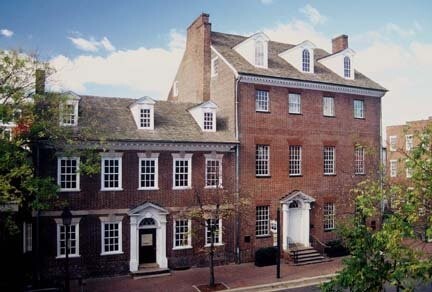Privileged Pour: Hannah Griffith's Coffeehouse

Welcoming Visitors
Eighteenth-century notions of "respectability" could usher one widowed mother of many to the almshouse, while a similarly dispondent young widow might possess a reputation that opened doors of opportunity instead. The latter was the case for Hannah Griffith, the mother of eight and recent widow of a well-esteemed minister who was also a friend of George Washington. She was faced with vacating the church land she had called home while her eldest child proceeded to marry into the prestigious Fairfax family. Her reputation was determined upon social and familial ties, and was affected less by finances or even her considerable outstanding debt. Instead of the poorhouse, Hannah's perceived respectability empowered her to operate a dignified Alexandria, Virginia "Coffee-House" from 1794-1797.
Hannah Colville Griffith, born between 1745-1751, was raised in the New York colony by her parents Ann and William, originally of European origin. Her life would not be easy, but familial connections would serve to benefit her options along the way. Hannah's social status, despite financial woes, secured her admission into "respectable" circles that would be essential to the coffeehouse business she would operate from 1794 to 1797.
We are currently unable to know her at her core, and can only peel back a layer or two, allowing a glimpse into her life. Even that does not do her justice as we will be seeing her only through the lens of what her husband’s biographers felt were relevant. The correspondence between the couple was read and reduced, many years ago, by ecclesiastical biographers whose excerpts served to illustrate broader points related to her husband’s career as a minister, soldier, surgeon, and revolutionary of the Episcopal Church. The following is an attempt to search these biographies and the accessible primary sources they are built upon—including the papers of George Washington, newspaper notices, and court records—with the purpose of revealing her fortunate connections to members of the most prominent citizens of the day and the privileges these associations afforded Mrs. Griffith.
Hannah’s world completely changed in 1789 with the death of her husband, Dr. Reverend David Griffith. His departure left Hannah to manage their eight young children and a mountain of debt due to multiple mortgages on investment lots in the city of Alexandria, Virginia. After taking charge of the finances by petitioning the General Assembly for permission to sell her husband’s Kentucky assets[1] and moving out of the glebe house that had been provided by the Episcopalian Church, Hannah leased a commercial building in Alexandria from the developer John Wise. The impressive Georgian-style brick structure had been utilized previously as a tavern and included two spacious levels for main business operations, plus a basement and three dormer rooms in the attic.
Built in 1785, the building's second floor assembly room is thought to have been the largest room in town at that time. The auspicious location of the building, alongside the booming port city's Market Square, promised a plentiful stream of merchants who would require a decent place to conduct business. The last year that Hannah operated her coffeehouse, she likely benefited greatly from the clientele attracted by her distinguished new neighbor, John Gadsby- an Englishman who leased the larger building to the right of her establishment, in 1796. Gadsby's reputation for luxury and sound business ventures preceded him, thus his City Tavern and Hotel was an enormous success, attracting such notable guests as the first five U.S. presidents. Gadsby's ballroom surpassed the elegance of the smaller building's assembly room, but this would not have troubled Hannah, as the profitability of a coffeehouse did not rely on splendid balls such as Gadsby's last two Birthnight Balls attended by George and Martha Washington. Nor was a coffeehouse proprietor's focus the blissful accommodations of a guest's overnight stay, such as the one enjoyed at Gadsby's hotel by Thomas Jefferson the year of his presidential tie with Aaron Burr. Instead, Hannah Griffith knew a coffeehouse was an exchange-driven, business oriented place of prestige for the city's merchant class. Her business success would depend upon emiting infatuating rays of respectability that would attract and preserve a loyal customer base of wealthy upper-class men desiring to be seen as traveling in the finest circles.
[1] “Notice is hereby given,” listing Hannah Griffith petition items, including lands granted for military service, Virginia Gazette and Alexandria Advertiser (Alexandria: September 15, 1791).
Created by Kristy Huettner, 2020.
